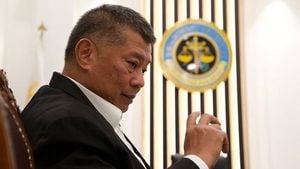The Mexican government is set to launch historically significant social welfare programs starting January 2025, aiming to uplift the quality of life for millions of citizens, especially targeting vulnerable populations. President Claudia Sheinbaum announced this comprehensive plan, which involves substantial investments and new initiatives directed at various societal sectors.
Among the notable programs is the Pensión Mujeres Bienestar, scheduled to commence on January 3, 2025. It will provide monthly financial support of 3,000 pesos to women aged 60 to 64, particularly from indigenous and afromexican communities. This initiative forms part of Sheinbaum's broader commitment to bolster support for marginalized groups.
"We will deliver the first cards on January 3 and will proceed to distribute them across various states, including the State of Mexico," Sheinbaum highlighted during her morning press conference. The program promises to provide these women without any intermediaries, ensuring direct deposits through new Bank of Wellbeing cards, which will serve as the primary access method for funds.
Alongside this, starting from February, the government will also roll out the Beca Universal for secondary school students, known as the Rita Cetina Gutiérrez scholarship. The initiative aims to financially empower families with school-going children, offering 1,900 pesos bimonthly per child for those enrolled in public schools. For families with more than one child, additional support of 700 pesos per child will be available, potentially reaching up to 3,300 pesos for families with three children.
Ariadna Montiel Reyes, the Secretary of Welfare, confirmed over 964,000 women have already registered for the Pensión program, emphasizing the demand for such social support, especially among vulnerable demographics. Of those registered, more than 810,000 are women aged 63 and 64, and around 153,000 are indigenous women aged 60 to 64.
The social assistance initiative extends beyond just women. It includes provisions for elderly individuals aged 65 and above, guaranteeing 6,000 pesos bimonthly under the existing Pensión for Adultos Mayores program. This support is also meant to encourage dignified living for seniors by facilitating their access to necessary resources.
To safeguard the health of beneficiaries, the government will also implement the Salud Casa por Casa program, which kicks off concurrently with the welfare programs. This initiative recruits medical personnel to conduct home visits and promote preventive healthcare for senior citizens and individuals with disabilities. All healthcare employees involved will undergo training starting January 2025, preparing them for their fieldwork by February.
"This program is dedicated to the permanent health protection of our elderly and disabled population, ensuring they receive not just economic support but also health services," Sheinbaum stated.
Further enhancing the health dimensions, mid-year 2025 will see the establishment of Farmacias del Bienestar alongside the Bank of Wellbeing branches. These pharmacies will provide free access to medications required by the program’s beneficiaries, including those necessary for managing chronic conditions like diabetes and hypertension.
Significantly, the financial backing for these programs is unprecedented, with the federal government allocating over 800 billion pesos (approximately 39.6 billion dollars) to fund the 2025 initiatives. This budget reflects not only the commitment to extend existing benefits but also to launch new projects aimed at some of the most economically challenged groups within society.
Sheinbaum's government recognizes the pressing need for improved welfare policies, particularly for women and children, who often face greater hardships. The social safety net is being expanded to include both economic support and educational enhancement, reinforcing the notion of education as a fundamental right and social value.
Through these programs, the Mexican government aims to address long-standing inequalities and provide substantial aid to the underprivileged. If all goes to plan, 2025 could serve as a transformative year for social welfare and economic support systems, striving to create fairness and equity for all demographics within the Mexican society.
With the ambitious rollout of these programs, there is hope for significant improvement as the government embarks on what may become recognized as its most impactful social welfare policy to date. Mexican citizens are encouraged to stay informed and prepared to access these benefits as they become available throughout 2025.



